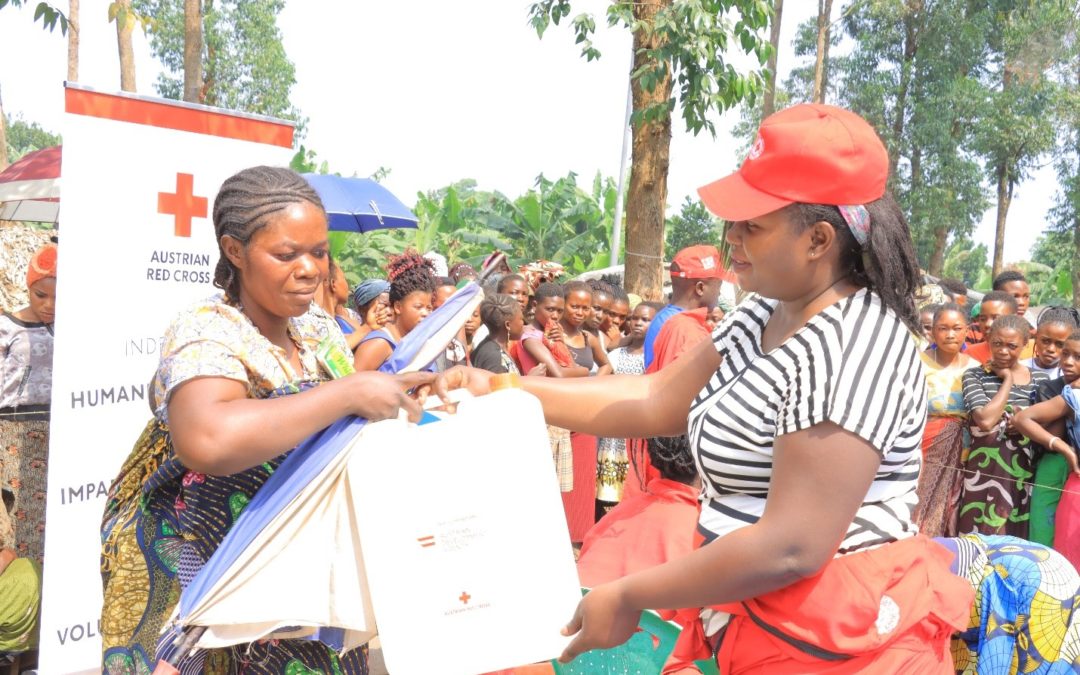Arua branch: Sanitation, Waste Management and Community Services
The SAWACOS project supported the operation of a faecal sludge treatment plant in Imvepi which was constructed by the ADA-funded Living Conditions in Imvepi Fostered together (LIFT) project. The project provided additional equipment, staff resources and technical support.
In addition, the Skybird programme provided resources to respond to the urgent needs regarding Menstrual Hygiene Management in Bundibugyo by training 15 volunteers on MHM. Thereafter the verification, sensitization of 5,000 people and distribution of 830 MHM kits and 500 jerrycans took place.
Adjumani branch: Innovative and Sustainable Toilet Construction and Sanitation Project
The Adjumani Branch aimed at improving the sanitary situation of the targeted people including the refugee communities, by piloting a collapse-resistant latrine and promoting the usage of SATO pans. The proposed latrine design suggests an offset pit so that the superstructure’s weight does not cause collapse, e.g. during the time of floods. The feedback at the end of the reporting period from the targeted people was positive. A total of 25 latrines for People with Disabilities were newly constructed. The hardware component was supplemented with Hygiene Promotion activities, e.g. radio talk shows that reached approximately 6,000 HHs. Furthermore, the volunteers conducted door-to-door Hygiene Promotion at 450 HHs. Additionally, economic empowerment interventions such as soap-making training were attended by 77 participants. The branch also undertook a learning visit to Lira Branch and enabled a selected number of targeted people to undertake exchange visits within the project area to learn and support each other.
Iganga branch: Menstrual Hygiene Management in Bulange and Magada Sub-counties, Namutumba District
The Iganga branch in the East of Uganda, built on the achievements of the first cycle Skybird micro-project and equipped 25 female farmer group members with skills of reusable pad-making to further strengthen their income streams. Furthermore, during the second cycle micro-project the branch targeted two schools to provide them with new latrine blocks for girls including an MHM room and a rainwater harvesting tank. The targeted students were: 551 students in Bugobi high school and 413 students in Nawansekese primary school. Additionally, 36 girls and 4 senior women teachers were trained in reusable pad-making and provided with start-up material. Sensitization campaigns at the two schools and through the radio created awareness of the need to break the silence about menstruation.
Kampala South branch: Empowering Communities to transform household waste into sustainable solutions
The Kampala South branch further strengthened the capacities of the Wastepreneur Groups which were formed during the first cycle micro project through the provision of trainings in the areas of solid waste management, briquette and compost manure making to 45 people. Additionally, each group was provided with a tricycle and a briquette-making machine. Moreover, through hygiene promotion on the HH level, the branch was able to reach 1,836 people (1,083f/753m) directly and approximately 140,000 people of the wider public through three radio talk shows and 16 adverts. The distribution of megaphones, t-shirts and 1000 posters enabled the branch to reach an estimated 24,000 people.
Lira branch: Innovation and partnership in WASH for improved living conditions in East Africa
The Lira branch transformed 20 family farmer groups from the first cycle micro-project to village sanitation and hygiene committees comprising 600 hygiene promoters. The committees were trained on PHAST methodologies. The training enabled the groups to motivate other households to improve hygiene and sanitation among the community members. The Sub-County Leaders are also linking the groups to different government programs. Moreover, awareness on hygiene promotion was strengthened through two radio talk shows. For sustainability purposes and to strengthen the livelihood situation of selected family farmer group leaders, training on slab-, tippy tap- and drying rack making, as well as hydroponic farming were conducted.
Moroto branch: Bokora WASH Community Engagement and Accountability Project, Matany Town Council
A strong focus was given to improve the sanitation situation of the targeted people through community dialogue meetings, a Community Engagement and Accountability training integrated with PGI, PHAST and PHASE, as well as the construction of a public toilet and 14 HH level latrines for demonstration purposes for the most vulnerable people. Moreover, 60 HHs were provided with construction material to build latrines.
Rakai branch: Enabling Rural Innovation on WASH and PGI in Kyalulangila Sub- County
The Rakai branch focused on hygiene promotion in targeted area, reaching 630 people on HH level. Furthermore, approximately 320,000 people were reached through three radio talk shows, posters and advocacy meetings. Moreover, the branch piloted Enabling Rural Innovation approach by providing training to 20 people. The approach emphasizes the strength and resources of the community and guides them on collaborative work to achieve more. Additionally, a PGI training was conducted for 16 people at branch level.
Gulu branch: Improved Access to Affordable safe water to the community of Gulu City and 2 Peri-Urban Sub-Counties
The branch rehabilitated 10 boreholes, constructed 5 protected springs and installed 7 water harvesting tanks at HH level that enabled the community to access safe water. Furthermore, it has increased the water points and reduced the long lines that the community normally experienced.
18 Water User Committees were trained to ensure the maintenance of the water points within the sub-counties and to promote WASH activities within the community. Additionally, 7 Pump Mechanics were trained to support the maintenance and repairs of broken boreholes. For sustainability purposes, the Skybird Project also provided the sub-counties with one toolbox each to enable the repair of the boreholes and water points.
52 Community Based Disaster Risk Reduction (CBDRR) members were trained and supported with farm tools and assorted vegetable seeds that are improving on their dietary and enable them to sell some of the vegetables in the market. Moreover, the Skybird Project provided raw materials to the CBDRR groups to produce briquettes for sale to generate income and increase their savings. The Branch conducted radio talk shows and aired spot messages to sensitize the community on the mandate of the Red Cross and its activities.
